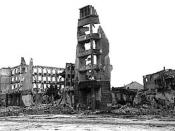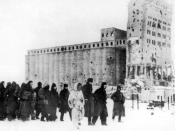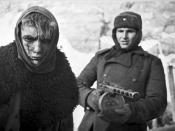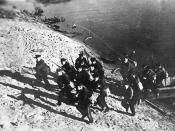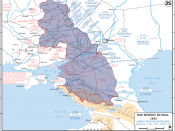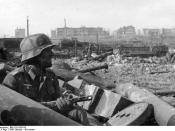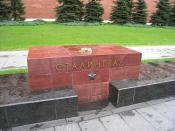What is the greatest battle of World War 2? For most people, D-Day is what comes to mind. However, an increasing number of historians nowadays recognize Stalingrad as a more significant turning point than Operation Overlord. The Soviet victory in Stalingrad was the biggest boost to anti-Fascist morale worldwide; it had on Germany an opposite effect. Overlord could not have been as successful without Stalingrad, which bankrupted Hitler in men and material. It was his greatest setback and paved the way to his ruin in Berlin two years later. Overlord was an incredible military achievement but Stalingrad was more than just that.
For instance, Stalingrad gave hope to the Allies. Russian soldiers, having successfully defended the city named after their leader, fought with high morale until the end of the war (http://www.sixthscalebattle.com/whats_new.html). Stalingrad shattered the Wehrmacht's invincible image and a victory was in sight for the Soviets. Stalingrad affected every anti-Nazi movement worldwide.
It inspired troops in the French Resistance to Mao's Red Army in China (http://www.columbia.edu/~lnp3/mydocs/culture/Battle_of_Stalingrad.htm). Though Hitler tried to censor the bad news of Stalingrad, it eventually leaked out and shocked German morale (http://www.sixthscalebattle.com/whats_new.html). The Fuhrer's own spirits were broken. When he heard that Paulus had surrendered he said, "The God of War had gone the other side" (http://www.historylearningsite.co.uk/battle_of_stalingrad.htm). He was outraged that Paulus had defied his orders in surrendering and did not promptly take his own life afterwards, as he advised him to (http://en.wikipedia.org/wiki/Friedrich_Paulus). He ordered a national mourning day not for the men lost in the battle but for the shame Paulus brought on the Wehrmacht and Germany with his surrender. He stripped him of rank in his anger and blamed his army generals for his own grave mistakes while Stalin promoted both himself and Zhukov to Field Marshal (http://www.sixthscalebattle.com/whats_new.html). The greatest irony in all this is that the great German Sixth Army, which was destroyed in Stalingrad, did not need to be involved at all (http://www.historylearningsite.co.uk/battle_of_stalingrad.htm). Army Groups A and B were doing well in the Caucasus when Hitler intervened and, against his generals' advice, ordered that Stalingrad be taken first, as it was named after Stalin himself. He thought that if Stalingrad was captured it would prove to be a great ideological and propaganda coup that would drastically undermine Russian morale. In taking on Russia, he underestimated the indefatigable will of the Russian soldier and civilian, especially in defending the city named after their great leader. Discipline was maintained in Soviet troops even when the average life expectancy of a soldier in Stalingrad was less than 24 hours (Reynoldson, 37). Hitler was afraid after his failure in Stalingrad because he knew the Soviets were coming and his days were numbered. Thus, in fear, he turned to the Jews as scapegoats and sped up the systematic extermination of these defenceless people (http://www.columbia.edu/~lnp3/mydocs/culture/Battle_of_Stalingrad.htm). The world saw the Nazi empire crumbling and was ready to deliver the final blow. Stalingrad was important as it changed the mood of the war. It gave Allied troops confidence in their invasion of Hitler's "Fortress Europe" on D-Day.
Some think D-Day triggered the collapse of Nazi Germany. Did they consider Stalingrad? The success of Operation Overlord in 1944 owed largely to the victory in Stalingrad in 1943, a year before. Stalingrad was the first major defeat of the Wehrmacht on land and gave the western Allies superiority in both numbers of troops, approximately 3.5 to 1, and in armored vehicles, approximately 4 to 1 (http://en.wikipedia.org/wiki/Battle_of_Normandy). Some historians think the ultimate collapse of the Nazi regime could only be achieved if the western Allies were successful in breaching the Atlantic Wall and opening a third front. However, on D-Day itself the Red Army advanced steadily towards Germany and engaged 80% of all its land forces (http://en.wikipedia.org/wiki/Battle_of_Normandy). How much slack did the western Allies really take off the Russians on D-Day? The western Allies faced only the remaining 20% of the German army in Normandy and Italy combined. These percentages not only indicate the Russians' greater contribution in defeating Nazism but also that Germany thought Russia a greater and more immediate threat than the rest of the Allies put together. Another claim some historians make is that had Overlord failed, Stalin would have made a peace treaty with Hitler, as before, and plunge the world into another Dark Age (Drez, 57). They think the Soviets are partially to blame for the start of World War 2. However, as Hitler betrayed Stalin in the breaking the Non-Aggression Pact in Operation Barbarossa such an event is highly unlikely. There is good reason to believe Russia would have fought until and succeeded in defeating Germany in the end, even if Overlord had not been successful. Russia had the sufficient resources and men to fight that Germany did not by the end of Stalingrad. Many historians, such as Richard Overy, have concluded that Normandy was not as critical as Stalingrad to the outcome of the war. Since the Germans suffered 93% of their casualties on the Eastern front, the battle of Normandy only shortened the war (http://en.wikipedia.org/wiki/Battle_of_Normandy). Without Overlord, the war would have gone on longer but the Soviets would have been victorious in the end. It would have been a very different war, however, had Hitler taken Stalingrad in 1943.
Hitler wanted Stalingrad not only for propagandist reasons but also because it was a major industrial city on the Volga River. The staggering losses he suffered in Stalingrad lead to his ultimate defeat in Berlin. Stalingrad was the Wehrmacht's first great defeat on land and a critical blow to which Hitler never recovered (http://www.faqfarm.com/Q/What_were_the_major_turning_points_of_World_War_2). He realized too late his resources were sapped dry and was eventually forced out of Eastern Europe as a result. Stalingrad cost Germany four times the number of casualties as D-Day and over 2 million lives in total (http://en.wikipedia.org/wiki/Battle_of_Stalingrad). It is considered the bloodiest battle in human history. The incredible losses Germany suffered ended Hitler's conquest for Libensraum, or space to live. (http://www.historylearningsite.co.uk/battle_of_stalingrad.htm). Paulus' Sixth Army begun the campaign with 600 000 soldiers and surrendered with only 91 000 remaining (http://en.wikipedia.org/wiki/Battle_of_Stalingrad). The fate of the Sixth Army was sealed by a lack of reinforcements and resources, especially oil. Had Hitler gained control of Stalingrad he would have gained control the Volga River, Russia's main waterway, a vital route from the oil fields to central Russia. He would have also secured the left flank of German armies to advance in to Caucasus, 80% of Russia's oil supply (http://en.wikipedia.org/wiki/Battle_of_Stalingrad). His failure in capturing Stalingrad lead to the Axis's inability to find another large enough fuel resource to continue an effective war (http://www.faqfarm.com/Q/What_were_the_major_turning_points_of_World_War_2). The Russians suffered heavy losses in Stalingrad but they were able to recover with their huge well of reserves and resources at disposal. They bought time to relocate their weapons factories and realized the potency of "guerrilla warfare" to defeat the more technologically-advanced Germany. Most importantly, they learned that the Germans could be beat (http://www.faqfarm.com/Q/What_were_the_most_important_battles_of_World_War_2). All this was essential to the ultimate Soviet triumph over Nazi Germany in Berlin.
The Battle of Stalingrad was central to the outcome of World War 2, even more so then Operation Overlord. It was in Stalingrad that Hitler lost his pride and power. The Soviet victory rallied the Allies and robbed Hitler of resources and men, which ended his influence in Europe. It was also contributed significantly to the success of the western Allies on D-Day. It is important to acknowledge the considerable role played by the Soviets World War 2. D-Day is now such a big part of North American pop culture that no other battle of World War 2, indeed few other battles in any war, is as familiar or as symbolic. It is famous in film and literature and hailed as the greatest battle ever fought. The battle of Stalingrad, however, does not receive the credit it deserves. It is important that we remember the triumph in Stalingrad; a deciding factor in defeating Nazism and ensuring peace and human rights for all.
Works Cited"Battle of Normandy." Wikipedia: The Free Encyclopedia. 16 Nov 2006 .
"Battle of Stalingrad." Wikipedia: The Free Encyclopedia. 16 Nov 2006 .
Drez, Ronald J. remember d-day: The Plan, the Invasion, Survivor Stories. Washington D.C.: National Geographic Society, 2004.
"Friedrich Paulus." Wikipedia: The Free Encyclopedia. 10 Dec 2006.
Kent , Beuchert. "What were the major turning points of World War 2?" FAQ Farm: The Wiki Answers Community. Wikipedia. 16 Dec 2006 .
"Molotov-Ribbentrop Pact." Wikipedia: The Free Encyclopedia. 10 Dec 2006 .
Ottrando, John . "Battle of Stalingrad." Sixth Scale Battle. 22 February 2006. 16 Dec 2006 .
Proyect, Louis. "Battle of Stalingrad." Columbia University: In the City of New York. 14 May 2001. Columbia University. 15 Nov 2006 .
Reynoldson, Fiona. Key Battles of World War II. Chicago, IL: Heinemann Library, 2001.
Trueman, Chris. "The Battle of Stalingrad." History Learning Site. 16 Dec 2006 .
Vance, Ryan. "What Were the Most Important Battles of World War 2?" FAQ Farm: The Wiki Answers Community. 17 September 2006. Wikipedia. 15 Nov 2006 .


